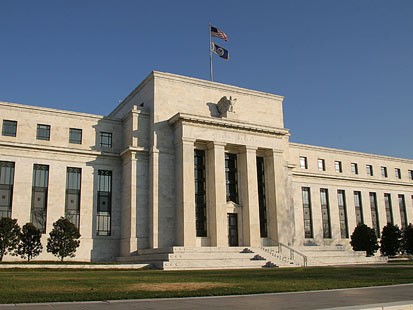
The Federal Reserve Board
The critics of the Federal Reserve don’t get it. Here are two articles in the WSJ and NYTimes that describe the withering ideological attack the US central bank has sustained since the onset of the global financial crisis. In recent posts, Nov. 15 and Nov. 18, I have argued that deflation risk is real and requires unorthodox thinking and action by the Fed, including quantitative easing (see quote below). I have also argued, and will continue to argue, how ill-informed, lazily ideological, and at times “Stone Age” QE’s detractors have been (Rand Paul and his libertarian dad are sharpening their stone axes).
This cabal, with its doctrinaire adherence to free market principles, does not understand key lessons from financial history, especially from Japan’s lost decade and the Great Depression. The ignorance of the Fed’s detractors would be fine, except that they have been rather vocal of late, causing a sharp rise in long bond rates and putting our nation’s (and the planet’s) economy at risk.
Snark aside, I believe the argument against QE claiming it is inflationary has merit. However, the downside of deflation is at times a much greater risk than an inflation surge. Furthermore, the time available right now to staunch rising inflationary expectations remains ample. The current onslaught against QE is, I believe, ideologically-based and lazy. The Fed’s critics ease back comfortably on the black-and-white sofa of the free market, the way most Republicans did during the dog days of crisis in 2008-09, instead of doing the hard gray thinking about what is an appropriate level of government intervention to save the market. (In fairness, some Republicans, including Hank Paulsen, George W. Bush, and even Mitch McConnell, did do some hard gray thinking and acting during the dog days.) Today’s know-nothing Republican Party is in the hands of the cave men (and women), whose first thought is “Abolish the Fed!”
Today, we need to maintain the current fiscal stimulus, while boldly pursuing a medium-term plan to reduce government debt, as we keep in place an environment of easy money. The IMF and many Wall Street analysts advised just such a strategy to emerging market countries in similar straits over the years. These are the most prudent macroeconomic policy settings for the current period. And, the threats to abolish the Fed (Rand Paul), the cute remarks of wealthy guys in their investment letters, such as Grantham’s “Night of the Living Fed,” threats to change the Fed’s charter (Tea Party Congressman Mike Pence), and efforts to dumb down the electorate (Palin) only serve to, well, dumb down the electorate and raise long bond rates, squelching the fragile recovery we hope we are in.
Scher quote from November 15:
With deflation, “[d]ebtors owe a certain amount, but the price of their goods (or their labor) falls making it difficult for them to service their debts. Widespread defaults occur and the economy contracts. Unemployment rises (to around 25% in the Great Depression vs. under 10% today). As long as debtors pay their debts, creditors, such as Gross and Grantham, can reap real profits. Maybe that’s why they wrote their silly investment letters. Trouble is, with deflation, debtors can’t pay and ultimately, the short-sighted Gross and Grantham suffer too. Deflation is scary and preventing it well worth the risk of taking unorthodox measures, anathema to bond investors. Unorthodox because the central bank is attempting to directly influence long-term interest rates, which can backfire if inflation ticks up. But that backfiring means a little more inflation in the short run, which can be countered later on…”